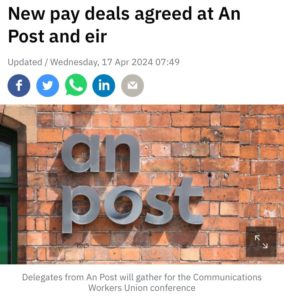Separate pay deals have been agreed at An Post and telecoms company eir.
The Communications Workers Union (CWU), which represents workers at both companies, has announced the pay agreements as delegates gather for its biennial conference which begins in Galway.
The new two-year pay deal at An Post provides for an 8% increase, paid in three phases.
The agreement will conclude on 31 December 2025.
The pay agreement at eir was finalised with the assistance of the Workplace Relations Commission (WRC).
It will provide for an 11% increase in base pay over 33-months from 1 July 2024 for those earning up to €50,000, and 10% for workers earning up to €70,000.
The agreement also provides for pay progression for managerial grades which could see increases totalling 13% over the duration of the deal.
”We have concluded discussions on pay with the CWU after several months of local discussions,” a spokesperson for eir said.
“The agreement was reached with the assistance of the WRC.”

Arrangements are underway to conduct separate ballots of CWU members at An Post and eir on the pay deals.
“The proposed pay agreements we will put to our members are the culmination of difficult and protracted negotiations against the backdrop of high inflation, higher interest rates and increased pressures on household budgets for ordinary workers trying to support themselves and their families,” said CWU General Secretary Seán McDonagh.
“We are confident that these agreements will provide much needed increases in pay for workers at An Post and eir, and a level of certainty for their leadership.”
Five hundred delegates from across the Irish postal/courier and eComms sectors will gather for the CWU conference which takes place today and tomorrow.
Members will consider a range of pay and other issues affecting the world of work for communications workers across Ireland’s postal, telecommunications and tech sectors.
Delegates will hear calls for the Government to give workers the legal right to organise and collectively bargain through trade unions and for these rights to be provided for in the transposition of the EU Directive on Minimum Wages into Irish law later this year.
“Organising workers is centre stage and at the heart of what we do as a trade union,” Mr McDonagh said.
“However, we continue to face strong anti-union bias and opposition from many – but not all – multinational companies located here across the postal/logistics, call centre and tech sectors.
“Some of these companies also hold government contracts.”



